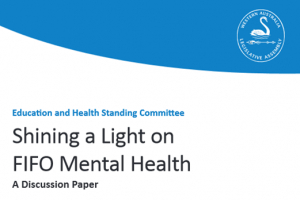Shining a Light on FIFO Mental Health

When Anita and Pete Miller decided to speak out about their son Rhys’ suicide in his donga in July 2013, they could not have anticipated the response. Other families came forward to speak of similar experiences. The WA Legislative Assembly decided to establish an Inquiry into the mental health impacts of FIFO.
Determined to raise awareness about the importance of mental health and to help prevent other families having to experience their tragic loss, Anita and Pete gave evidence to the Inquiry, along with some 70 other submissions.
The Inquiry has released its discussion paper, Shining a light on FIFO mental health.
The final report is expected to be released in June, 2015.
If you are interested in providing information to the Inquiry, you can do so before the 29th January 2015.
Women doing FIFO and people working in hospitality are particularly encouraged to make a submission and assist the Inquiry with its work.
You can read the discussion paper.
You can also make a submission by emailing
laehsc@parliament.wa.gov.au
Here are some of the main issues the Inquiry has identified so far:
There is significant overlap in terms of the population most at risk of mental health problems – namely, males aged between 25 and 44 – and the predominant demographic characteristics of the FIFO workforce.
FIFO workers spend extended periods of time away from home, family and other social support networks. This makes it more difficult for them to gain access to the help they might need if they encounter mental health problems. This help can take many forms, from formal medical and psychological assistance, through to the reassurance that family and friends can provide to a person experiencing distress.
Work culture also emerged as another characteristic of the FIFO model, with many submitters to the inquiry suggesting that the macho culture and constant refrains to “toughen up”, make it difficult for people to come forward if they need help. An equally essential component of the work culture was the fear expressed by many to the inquiry that those who admitted to mental health problems risked losing their job if they came forward.
Most submissions to the inquiry sought to bring focus to the lack of quality research on the impact of FIFO on the mental health of the workforce. Nonetheless, a range of research was provided in support of one point of view or another. The Committee offers the view that research is needed to establish the extent to which FIFO work practices are safe, as well as the extent to which risks to psychological wellbeing are managed. This will obviously require action by the resources sector.
The Inquiry pays particular attention to the data about suicides by FIFO workers. The Committee was not able to confirm the nine suicides reported by the media, but notes that this is hardly surprising given the absence of reliable data. The Committee is of the
view that more should be done to collect information about suicides and intends to pursue this issue as the inquiry progresses.
The Committee acknowledges that the industry currently has in place a range of services for employees in relation to mental health. These services include Employee Assistance Programs and, in some cases, on‐site support services in the form of Chaplains. There was a view expressed by many of the non‐resources sector submitters that more could be done to provide better on‐site mental health and wellbeing services; an issue that the Inquiry will continue investigating.
An issue that arose in several phone calls to the Inquiry related to the mental health evacuation policies in place in the resources sector. This was not an issue that the Committee had considered until people came forward with their stories, and a number of questions have been raised in relation to the duties owed by employers to their employees. This is particularly so in the case of notification of next of kin and unaccompanied travel for at risk employees returning home.
Finally, the complex issue of regulation is also examined in the discussion paper. Of particular significance is the exclusion of accommodation facilities for mining workers from the scope of the legislation in the mining industry. It seems that this exclusion may not apply to the petroleum industry. The Inquiry will most likely seek expert assistance on the issues raised in relation to regulation and would welcome further input from stakeholders on some of the issues identified in the report.
The Committee will table its final report in June 2015 and will continue with its evidence gathering activities in the coming months. Interested stakeholders are invited to respond to the discussion paper before 29 January 2015.
For more info check out the website.
